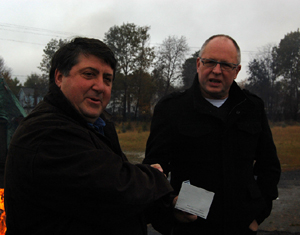Please Click Here to find recent news, events and information from CUPE Ontario.
The Sudbury Star
Tue Oct 27 2009
Page: A3
Section: News
Byline: RACHEL PUNCH, THE SUDBURY STAR;
 Secret trade deals are threatening local economies, communities, jobs and the environment, say the leaders of the “Say bye to buy local tour” that stopped in Sudbury on Monday.
Secret trade deals are threatening local economies, communities, jobs and the environment, say the leaders of the “Say bye to buy local tour” that stopped in Sudbury on Monday.
Sid Ryan, Canadian Union of Public Employees Ontario president, and Maude Barlow, Council of Canadians National President, are touring the province to raise awareness about the trade deals.
“We are really concerned that there are some pretty secret free trade deals taking place provincially and federally that nobody knows about that are going to impact on the local rights of communities, municipalities, provinces, school boards and universities to spend local tax money on local priorities,” said Barlow.
Barlow and Ryan held a trade discussion at Rainbow Cinemas on Monday night. The pair visited the picket line at the Vale Inco smelter in Copper Cliff in the afternoon, where Ryan presented striking Steelworkers with a cheque for $5,000.
“I think the fight here (in Sudbury) is for local dignity, pensions and decent working conditions. This is going to be the fight that happens everywhere, but at least we still have some local rules that we can use if you have a government with a backbone,” Barlow said.
Those rules are threatened by the trade deals — the proposed Canada-U. S. bilateral procurement agreement covering subnational governments, the Ontario-Quebec Trade and Co-operation Agreement signed Sept. 11 and the Canada-European Union Comprehensive Economic and Trade Agreement.
Contracts for everything from health care services to building roads and bridges would be “unlocked” and open to bidders from other provinces or other parts of the world, Barlow said.
Prime Minister Stephen Harper, for example, is offering up subnational government procurement (local spending by municipalities, provinces, etc.) to the U. S.
“I think it’s really part of a larger ideological belief that Harper has, which is just open it all up. Use these trade agreements to get rid of health and safety rules, fair trade rules and local food production rules,” she said.
Ryan said the new rules will lead to a “race to the bottom” when it comes to these types of rules and regulations.
He said, for example, a tradesperson or health care worker coming to Ontario from another province would automatically be permitted to work here regardless of differences in training and other standards.
“All the standards will become harmonized and more than likely harmonized to the lowest common denominator,” Ryan said.
Ryan used another example in the health care sector. One province may have a certain standard of care. A company from another province with a lower standard of care may apply for a contract and argue the higher standard is a barrier to trade.
“It’s all about the lowest common denominator,” Ryan said.
CUPE and the Council of Canadians are encouraging municipalities to pass fair wage policies, such as the one passed by Sudbury city council in 2007.
Even those policies, however, may be scrutinized if these agreements pass, Ryan said.
“Their policy could be deemed to be a barrier to trade,” Ryan said.
For more information, visit www.canadians.org.
